
Angus and Rosemary's Miscellany
of Malvern - Health and Safety
Safety in the HomeIt is a good idea to walk round your home occasionally with a view to identifying potential hazards and eliminating them. Below you will find some tips on keeping safe. (Internet related and social issues might also need to be considered but are not addressed here). OverviewIt is a sad fact that most people are more likely to be killed or injured at home than at work. Every year, according to ROSPA, in the UK almost 4,000 people die in accidents in the home and 2.7 million turn up at accident and emergency departments seeking treatment. Many of these are young children and old people. Many minor accidents are probably never reported. Accidents happen when,
The pain and misery caused by accidents can be reduced by spending a little time thinking about potential hazards and taking steps to reduce or eliminate the danger in your home. Some hazards are listed below to help you get started. At the end are some links to where further information can be found. HazardsSlips, trips and falls (mainly affect the young and old)
Very old people are more vulnerable to falls due to to failing eyesight and deteriorating balance. Once fallen they might not be able to get up without help. FireBe aware once started fires can burn out of control very rapidly. Your first thought should be to preserve life. Unless the fire is trivial, get everyone out, stay out and call the fire brigade.
The best thing is to eliminate the danger such as throw out the chip pan and buy oven chips, keep matches and lighters out of reach of children, and ban smoking indoors. A lid, fire blanket or dampened tea towel can be used to deal with pan fires caused by hot fat. Dry powder extinguishers can be used on small fires, but be aware the powder gets everywhere and creates a lot of mess. If electrical equipment starts smoking, turn it off and unplug it. A smoke alarm should be fitted to warn of any fire while the family is asleep in bed. All the family should be taught what to do in the event of a fire or emergency. When away on holiday or business you should always familiarise yourself with the escape route before going to bed. PoisoningCarbon Monoxide gas is a silent killer. Have gas fires, boilers and flues checked annually to minimise the risk of carbon monoxide poisoning. Ideally install a Carbon Monoxide alarm in you home to warn of poisonous fumes. These can also be used in student and holiday accommodation. Read labels and store kitchen cleaners etc out of reach of small children. Keep medicines out of reach. Store and prepare food safely - to avoid food poisoning.
Burns and ScaldsTake measures to prevent small children touching hot surfaces or pulling pans, irons or kettles down on themselves eg use pans on back of stove and keep leads short. Run cold water before hot. CutsTake care when using knives, scissors, razors and opening square cans and keep sharp objects away from small children. Take care when using cutting tools such as hand saws, circular saws, chainsaws, power planers, chisels, shears and hedge trimmers, in order to protect yourself, your children, your neighbours and your pets. Make sure a circular saw has stopped rotating before it is put down! BackstrainLift only what you feel capable of. Keep back straight and bend knees. Be aware bending, lifting, and twisting to put your child in the car is a good way to put your back out! If your children have to carry a heavy bag to school, equip them with a backpack which will spread the load over both shoulders. Electrical overheatingReels of extension cable should be unwound before use, especially if carrying a heavy load. The reason for this is the cable will gradually overheat and catch fire, due to inadequate circulation of air; especially during hot weather. Two fit young adults recently died in a house fire at Cotheridge attributed to this cause. Use of electrical adaptors and multi-gang extension leads is not advised where heaters and kettles are concerned, as this could either lead to fuses blowing or cables overheating. Not so much of a problem for equipment drawing little current such as home computers. Fitting the wrong fuse can cause a fire in the event of a fault. Table lamps, food mixers etc usually have a 3A fuse, while heaters with thicker cable will have a 13A fuse. If an electrical device overheats or smokes turn it off and unplug it, if you are able. Electric ShockSome possible causes include,
Use of a plug in Residual Current Circuit Breaker (RCCB) will significantly reduce the risk of death. Wearing rubber soled shoes, standing on a rubber mat, and keeping left hand behind back might be appropriate for some hobbies? CrushPossible causes include,
When digging in the garden take care not to put fork through foot! Eye Damage or IrritationMay be caused by,
Your eyes are your most valuable asset. When appropriate, keep windows shut when driving off road; either wear a visor or safety glasses when using power tools. General TipsLook for safety symbols on packaging and carefully follow instructions. Many of us will be familiar with the old pictograms in an orange square such as for irritant and flammable substances.
But note since 1st June 2017 following the Global Harmonisation Scheme (GHS) the orange warning signs are no longer used and have been replaced by a red diamond on a white background.
Click to see more hazard pictograms on the HSE website Don't transfer substances to an unlabelled container such as a lemonade or milk bottle. Your nearest and dearest will not know what danger lurks there. Don't wear a scarf or tie when working with rotating machinery. Remember the electric fan of some cars can start even when the engine is switched off. Take care to keep feet and fingers away from the blade of rotary mowers. Ideally wear safety shoes or boots with a strong toecap. Hearing protection - when appropriate wear ear muffs or plugs Respiratory protection - wear a dust mask eg when sawing MDF. (note these are rated FP1 to FP3, the latter giving better protection) It can be a good idea to wear leather gloves to avoid scratches and skinned knuckles. Wear nitrile gloves to protect hands from used engine oil, petrol diesel and grease.
These provide better protection from oil and petrol than cheap plastic gloves, allow a good measure of manual dexterity, and are not lubricated with powder that might irritate the skin. The cost is about £20 for a box of 200 and the gloves can be obtained by mail order from Choice Stationery, RS and other suppliers. Note these particular gloves cover the hand but not the wrist. Wear long PVC gloves when clearing drains. Bump caps can provide useful protection from minor knocks when working at home. For example see Scott Safety Firstbase 3 bump cap. After washing hands apply a drop of E45 Lotion from pump dispenser to restore greases washed from skin. This is particularly useful if you suffer from dry skin.
Folding aluminium work platforms also known as Hop-Ups and Step-Stools, can be handy for cleaning the roof of the car, decorating and DIY jobs. These can be purchased locally from Argos, B&Q, Handyman House and builders' merchants such as Travis Perkins These are typically 80 cm wide but many are quite narrow; typically only 30 cm deep. This will be adequate for many tasks and makes them light to carry and easy to stow. 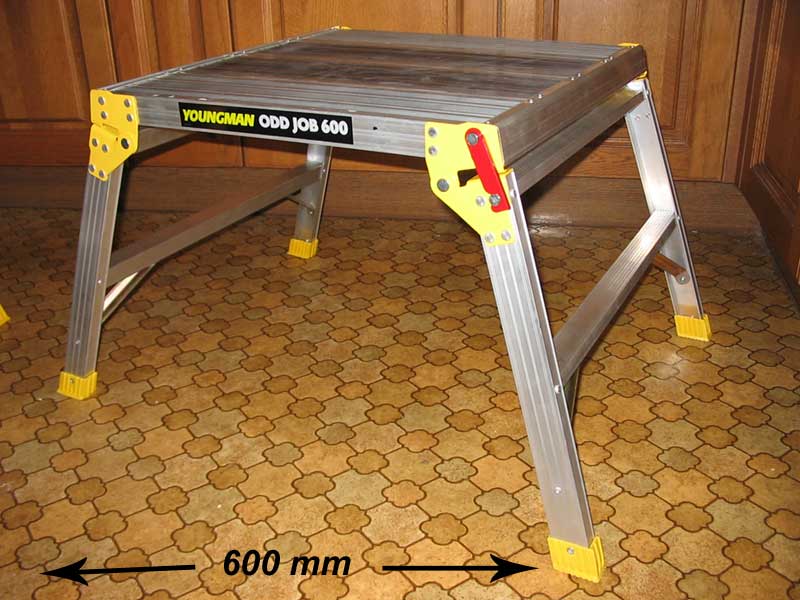
However wider versions are available such as the Youngman Oddjob 600, pictured, which is 600 mm square and obtainable from Midland Ladders and Machine Mart (see photo right). This can be purchased with either aluminium legs or insulated GRP legs (for electrical work). Bear in mind however the wider version is more cumbersome and expensive. Summary of Advice for ParentsChildren are very inquisitive and unaware of danger. They climb on things so if cupboards are liable to tip over they should be attached to the wall. Precautions should be taken to stop children falling out of windows. Pills, medicines, kitchen cleaners etc should be stored out of reach. Older children are fascinated by matches, so if you don't want your home damaged or burnt down hide them away or at least brief children on hazards. Where possible use only the back rings of cookers and position pan handles away from little hands. Keep the leads of kettles short so that toddlers can't pull scalding water on top of themselves. To avoid scalds turn the hot water thermostat down to about 65 deg C and put cold water into the bath first. Look to see where children's fingers are before shutting doors. Children should not be wrapped in cotton wool - when old enough, explain dangers to them and how to avoid them. Useful LinksSafety advice from Hereford and Worcester Fire and Rescue Service There were some other helpfull web pages, but lately these have been removed - perhaps to avoid the possibility of liturgation. A lot of advice is now lengthy and verbose so we have not included it here.
Please email suggestions for improvements to this page to the webmaster. |
|
Last updated 3rd December 2019 |
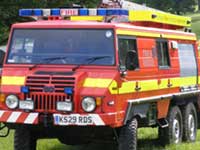 Possible causes of fire
include,
Possible causes of fire
include,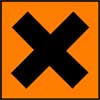
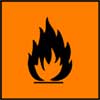


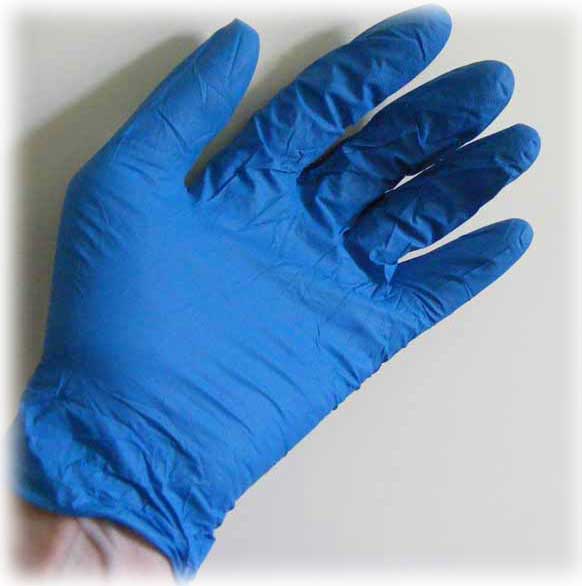 These
also can protect your hands while painting and decorating, handling household chemicals
and working on the car. For light work, we can recommend Kimberly-Clarke, KleenGuard G10 powder free,
blue nitrile gloves.
These
also can protect your hands while painting and decorating, handling household chemicals
and working on the car. For light work, we can recommend Kimberly-Clarke, KleenGuard G10 powder free,
blue nitrile gloves.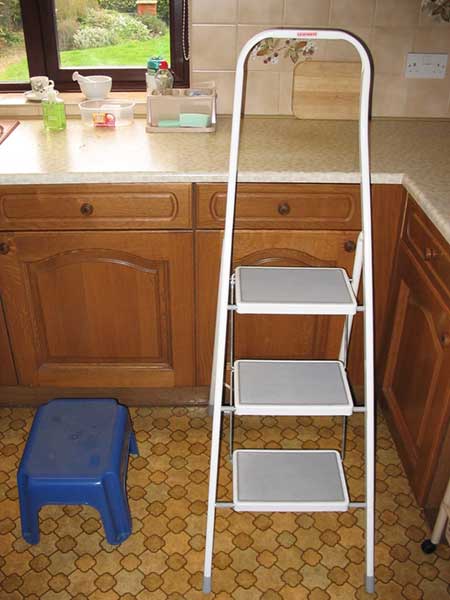 When
items in the kitchen are too high to reach it's better to stand on a step
stool or small set of steps than a chair. Short people will find a
step stool invaluable for gaining access to cupboards above work surfaces.
Steps can be very useful for reaching the top of cupboards or a fuse box.
Better ones have a wide tread and a grab rail.
When
items in the kitchen are too high to reach it's better to stand on a step
stool or small set of steps than a chair. Short people will find a
step stool invaluable for gaining access to cupboards above work surfaces.
Steps can be very useful for reaching the top of cupboards or a fuse box.
Better ones have a wide tread and a grab rail.